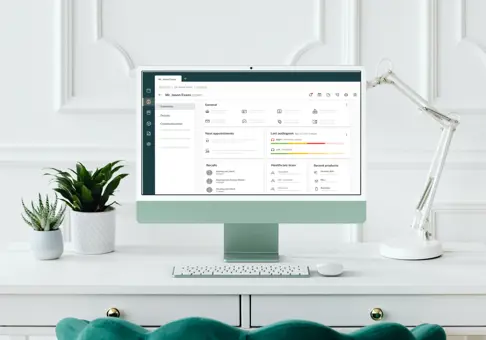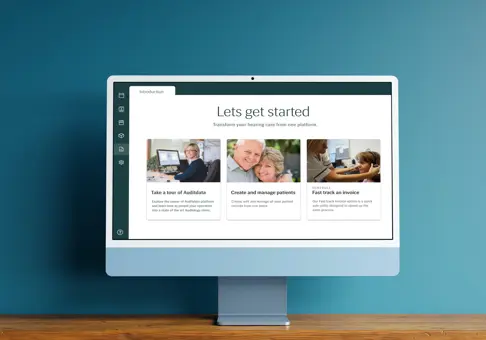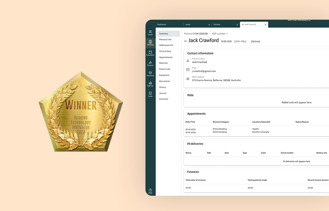
Having the best audiology tools will make your job more manageable and effective, allowing your hearing center to provide exceptional service and care.
We’ve prioritized the tools that your hearing practice should have to provide the highest quality treatment, collect clinical data, optimize schedules, track inventory, boost leads, improve marketing efforts, drive sales, and maximize success.
1. An Audiometer That Delivers Benefits
An audiometer is central to all clinics and should deliver the testing protocols to drive clinical quality and the customer experience. Many audiometer types are available, including portable tools that are invaluable if you conduct hearing exams out in the community.
Today's audiometers offer excellent user interfaces and immediate storage of information. Preferably, you’ll use a solution that provides all the testing module types you need, including pure-tone and speech audiometry. Even better if it offers Real Ear Measurement module.
Auditdata’s Measure system delivers all of this and more, including hassle-free calibration. Our calibration in the plug system means there is no need for an on-site engineer to calibrate the audiometer.
With Auditdata SWAP service, we ship calibrated transducers to you well in advance of the due date of the old ones. You plug in the new transducers, and you’re ready for your next client without any downtime or interruption. You simply return the expired transducers to us by mail.
2. A Video Otoscope
An excellent manual otoscope is worth its weight in gold. Proper lighting and magnification allow a thorough assessment of the ear canal and TM. However, the customer can't see what you see, and manual otoscopes don't offer images for a referral.
A video otoscope solves these issues and enhances the customer experience, delivering higher customer satisfaction. Tools like this strengthen the credibility of your practice and the customer's perception of your expertise and capacity. It’s also an ideal tool if your hearing center offers cerumen removal. Auditdata provides a video otoscopy module that integrates seamlessly with our Measure system.
3. Cerumen Removal Kit
Offering earwax removal in-house ensures that ear wax blockage never gets in the way of a hearing assessment again. You shouldn't limit your practice to one removal method. Instead, offer several methods such as irrigation, micro-suction, and manual removal to provide the best and most flexible service. Doing so also means that you can generally remove the earwax blockage in one session.
Many medical supply businesses provide suction pumps, associated cannula, curettes, wax hooks, and other manual removal tools. There are many different irrigation pumps available for irrigation. While some are simple affairs available for a couple of hundred dollars, larger dedicated ear irrigation units cost much more. Most people find that the more expensive units get rid of the wax blockage in 3 to 5 minutes.
That means that you should be able to fit in more appointments, and the equipment should pay for itself quickly. With an expensive resource like that, any business must maximize its use, so it’s wise to centralize it in one room that every clinician can access.
4. Microscope, Loupes, or Something Else?
When undertaking wax removal, you need the best visibility possible. When matched with a headlight, a high-quality set of loupes helps maximize visibility. While plenty of cheap options are available, it is worth spending some money on decent loupes, which will offer much better visibility, contrast, and depth perception.
Loupes are available in both headband-mounted models and glass-mounted models. Having said that, if you are considering offering ENT services in your practice, or offering extended-wear hearing aids, the better option is an ENT microscope. Of course, this option is expensive, but the visibility and depth perception are unsurpassed by any other solution.
With an expensive resource like a microscope, you need to maximize its use, so again, it’s beneficial to centralize it in one room that every clinician can access. Of course, there are other visual aids available based on a smartphone and either a specula accessory or an endoscope.
The vision and depth perception of some of these tools are outstanding. It takes some training to use them effectively, but they offer a superb view and the ability to record the procedure.
5. An Ear Scanner or Impression Material
Should you cast off your impression material and syringes forever and invest in an ear scanner? Truly, it depends. Ear scanners have pros and cons, and they are a significant investment that would take years of use to pay back. Generally, they are slower than taking impressions, but they offer the most profound 3D model right up to the tympanic membrane.
If you often provide IICs or deep-fitting custom aids, the 3D model is valuable. Ear scanners also ensure that your order reaches your preferred manufacturer the same day versus a few days by mail. The cost-benefit analysis is one that any practice will need to carefully consider here.
6. A Professional Drying Solution
Moisture-related issues are a constant concern for hearing aid users and professionals alike. Stocking and supplying hearing aid dryers will help your customers keep their aids functional.
It makes sense for a retail audiology business to have a professional-grade drying system in their hearing center. This piece of equipment will add a valuable tool to your clean and care visits and provide a necessary service for your customers.
7. Practice Management Software
The foundation for success in retail audiology is built around managing your tasks, employees, and customer data. A good PMS, like Auditdata Manage, is crucial to do this well.
Manage helps audiology hearing centers boost efficiency and provide exceptional care with integrated clinical management, customer relations management, scheduling, marketing, stock control, reporting, financials, and more. Our Manage system is fully loaded, offering everything a retail audiology business needs to maximize successes.
8. Stock Management System
Every hearing center owner knows that having a good supply of hearing aid parts is essential. Domes, receivers, thin tubes, and even battery drawers are crucial to keeping customers' hearing aids in tip-top shape. To ensure you always have the proper supplies on hand, you need an efficient, effective stock management system.
Your system should keep track of all your essential hearing aid parts, as well as the hearing aids that move through your business. It’s also a crucial tool for offering trial devices or loaners. Our Manage Practice Management System (PMS) makes it easy and accurate to track inventory.
9. Marketing Tools
The average cost for new client acquisition is $450 or more. Many factors contribute to that cost, including the time and materials spent on marketing. To help boost marketing success, we have created an informative eBook filled with proven tips.
In this guide, we discuss strategies and methods for converting leads to sales, including proper communications tools, messaging, digital efforts, and more. We also spotlight how audiology hearing centers can use Manage to enhance and improve their marketing campaigns to generate more attention, interest, leads, and sales.
10. A Good Screening Tool
Tablet-based hearing screeners are an affordable, reliable, and simple way to screen people's hearing and generate more leads to your hearing center. These devices offer audiology hearing centers a variety of significant benefits when used within their practices or externally in the community.
In your hearing centers, they allow pre-qualification of walk-in prospects, and can also be used to screen your customers’ loved ones when they accompany your customers to the hearing centers. Portable screeners, like Auditdata’s Engage, can be used at a variety of external locations, such as health fairs, community events, local businesses, assisted living facilities, physicians’ practices, pharmacies, etc.
This is a great way to expand your geographical footprint without the costly infrastructure investment of opening new hearing center locations. Using a tablet-based screener ensures reliable results and means that customers who spend time with your clinicians are pre-qualified. That optimizes your clinicians’ time, ensuring they only see customers with hearing loss.
Auditdata's Engage solution comes out of the box with a standard testing protocol. It also provides complete control over the testing screens, including customizing the explanations, stimulus type, threshold determination setting, volume of the sounds presented, and much more. It provides centralized control enabling collection and management of customer data while staying fully compliant with GDPR and other data security requirements. And it works seamlessly with Auditdata Manage to effectively capture – and follow up on – leads.
While this isn't an exhaustive list, these tools are essential for audiology retailers and will help hearing center owners and managers stay on top of their business, market effectively, generate leads more cost effectively, broaden their service offerings, and improve the customer experience. These are all crucial elements in differentiating your business and attracting customers.
Other Blogs You Might Enjoy:

9 Reasons To Choose Manage As Your New Practice Management Software
Our innovative solution seamlessly integrates all aspects of running a hearing care retailer: screenings, scheduling, inventory, reporting, and more. It uniquely offers local support across all global time zones, includes reimbursement support for numerous country requirements, comes in multiple languages, and provides unprecedented integration to NOAH.

How To Get Started With Our Practice Management Software in 7 simple steps
Auditdata Manage is an innovative practice management software. Here’s how hearing centers can get started with our practice management system, Manage, in 7 simple steps.

What Is a Tablet-based Hearing Screener And How Can It Benefit You?
Hearing care providers work tirelessly to attract people to their clinics to screen them for hearing loss. If these folks are unable to visit the hearing care clinic in person, audiologists need to be mobile enough to come to them, using portable hearing screeners.
Don't Miss Out On the Latest Insights On Audiology
Sign up today to receive exciting updates, tips, and the latest newsletters from Auditdata.





